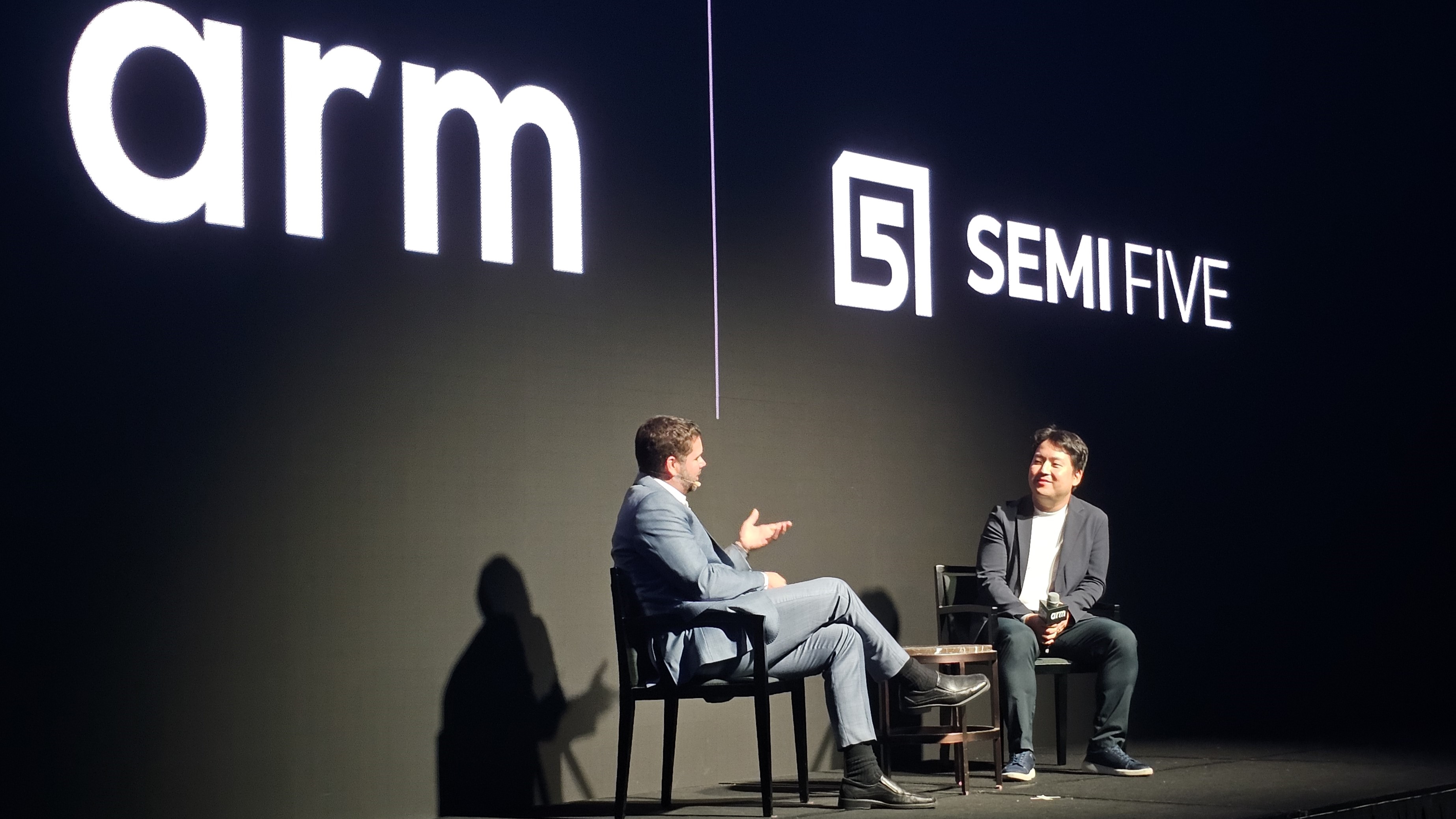Arm은 Arm Total Design의 1주년을 맞아 최근 새로운 업데이트를 공개했다.
Arm Total Design은 설계부터 파운드리 제조에 이르는 역량을 한데 모아 약 30개 기업의 참여로 빠르게 성장했으며, 에코시스템에 국내 반도체 설계기업 세미파이브를 비롯해 △Alcor Micro △Egis △PUF Security가 새롭게 합류했다.

▲Arm 테크 심포지아 2024에서 크리스 버기(Chris Bergey) Arm 수석 부사장이 조명현 세미파이브 대표와 대담을 나누는 모습
Arm Total Design 에코시스템, 1년 만에 2배 성장
삼성전자 파운드리·에이디테크놀로지·리벨리온 협력
Alcor Micro·Alphawave·TSMC 기반 칩렛 구축
Arm은 Arm Total Design의 1주년을 맞아 최근 새로운 업데이트를 공개했다.
Arm Total Design은 설계부터 파운드리 제조에 이르는 역량을 한데 모아 약 30개 기업의 참여로 빠르게 성장했으며, 에코시스템에 국내 반도체 설계기업 세미파이브를 비롯해 △Alcor Micro △Egis △PUF Security가 새롭게 합류했다.
에코시스템을 통해 Arm, 삼성전자 파운드리, 에이디테크놀로지, 리벨리온은 클라우드, 고성능컴퓨팅(HPC), AI/ML 학습 및 추론 워크로드를 대상으로 하는 AI CPU 칩렛 플랫폼의 시장 출시를 위해 협력하고 있다.
Arm 인프라 사업부 시장 진입 전략(Go-To-Market) 부사장인 에디 라미레즈(Eddie Ramirez)는 “AI 컴퓨팅 수요가 증가함에 따라 개발자는 컴퓨팅 플랫폼에서 성능과 전력이 최적화되고 접근성이 뛰어난 방식으로 혁신을 쉽게 실행하는 것이 중요하다”며, “Arm 컴퓨팅 서브 시스템(CSS)과 Arm Total Design은 하드웨어 및 소프트웨어 발전에 대한 더 빠른 액세스를 지원해 에코시스템 AI 개발을 가속화한다”고 피력했다.
■ AI 데이터센터향 신규 Arm 기반 솔루션
Arm Total Design은 글로벌 협업을 촉진해 생성형 AI 컴퓨팅을 위한 CSS 기반 솔루션으로 이어졌다. Arm과 삼성전자 파운드리, 에이디테크놀로지, 리벨리온이 협력해 AI CPU 칩렛 플랫폼을 개발한 것이 일례이다.
클라우드, HPC, AI/ML 학습 및 추론 워크로드를 대상으로 하는 이 플랫폼은 에이디테크놀로지의 네오버스 CSS V3 기반 컴퓨팅을 칩렛으로 구축하고 리벨리온의 REBEL AI 가속기를 해당 컴퓨팅 칩렛과 결합해 삼성 파운드리의 2nm 게이트올어라운드(GAA) 첨단 공정 기술로 구현된다.
송태중 삼성전자 파운드리 사업부 비즈니스 개발팀 상무는 “AI 및 HPC 설계에는 최고의 성능, 높은 트랜지스터 밀도, 에너지 효율을 제공하는 기술 솔루션이 필요하다”며, “Arm CSS의 유연성과 Arm Total Design 에코시스템의 강점을 활용해 하이퍼스케일러 및 클라우드 서비스 제공업체를 위한 AI CPU 칩렛 플랫폼을 제공하게 돼 기쁘다”고 말했다.
AI 워크로드가 빠르게 진화함에 따라 전체 AI 스택을 지원하기 위해서는 긴밀하게 결합된 CPU 컴퓨팅이 필수적이다. 데이터 전처리, 오케스트레이션, 검색 증강 생성(RAG)과 같은 데이터베이스 증강 기술 등은 모두 Arm 네오버스 CPU의 성능 효율성의 이점을 누릴 수 있다.
Arm은 이러한 요구 사항에 대한 지원을 CSS에 포함시켰으며, Arm Total Design을 통해 에코시스템은 Arm의 혁신 이점을 누리고 있다고 강조했다.
■ 특수 목적 AI 인프라를 위한 새로운 표준
CSS와 Arm Total Design은 지속 가능한 AI 데이터센터를 위한 하드웨어 기반을 구축하는 데 기여하고 있다. Arm Total Design은 이미 네오버스 N 시리즈 또는 V 시리즈 CSS로 구동되는 Arm 기반 테스트 칩 및 칩렛 제품 개발을 진행하고 있다.
Alcor Micro는 AI/ML 학습 및 추론 사용 사례를 겨냥한 CSS 기반 칩렛을 구축한다고 1일 발표했다. 또한, Alphawave는 AI/ML, HPC, 데이터센터 및 5G/6G 애플리케이션을 위한 CSS 기반의 자체 고급 컴퓨팅 칩렛을 발표했다. Arm 기반 칩렛은 Arm 파트너십을 통해 제공할 수 있는 다양성, 유연성 및 글로벌 공급망의 예시라고 Arm은 강조했다.
또한, Alphawave, Cadence, proteanTecs를 비롯한 Arm Total Design 파트너는 Arm 사양 및 표준 준수를 보장하기 위해 첨단 노드에서 CSS를 사용해 써드파티 IP 제품을 검증하고 있다. 즉, 파트너는 최첨단 노드에서 CSS 기반 맞춤형 실리콘을 구축하고 원활한 소프트웨어 경험을 제공받을 수 있다.
Arm Total Design 에코시스템은 파트너들이 시장에 출시하는 다양한 실리콘 솔루션이 통합된 소프트웨어 에코시스템을 활용할 수 있다는 데 이점이 있다. 일례로 PyTorch 및 Llama.cpp와 같은 오픈 소스 프로젝트에 Arm의 CPU 기반 추론을 최적화하는 Arm Kleidi 기술의 도입을 들 수 있다.
Arm은 이것이 가속기 없이 엣지 AI 컴퓨팅을 위한 CSS 기반 칩렛을 구축하는 Arm Total Design 파트너에게 특히 중요하다고 전했다.
